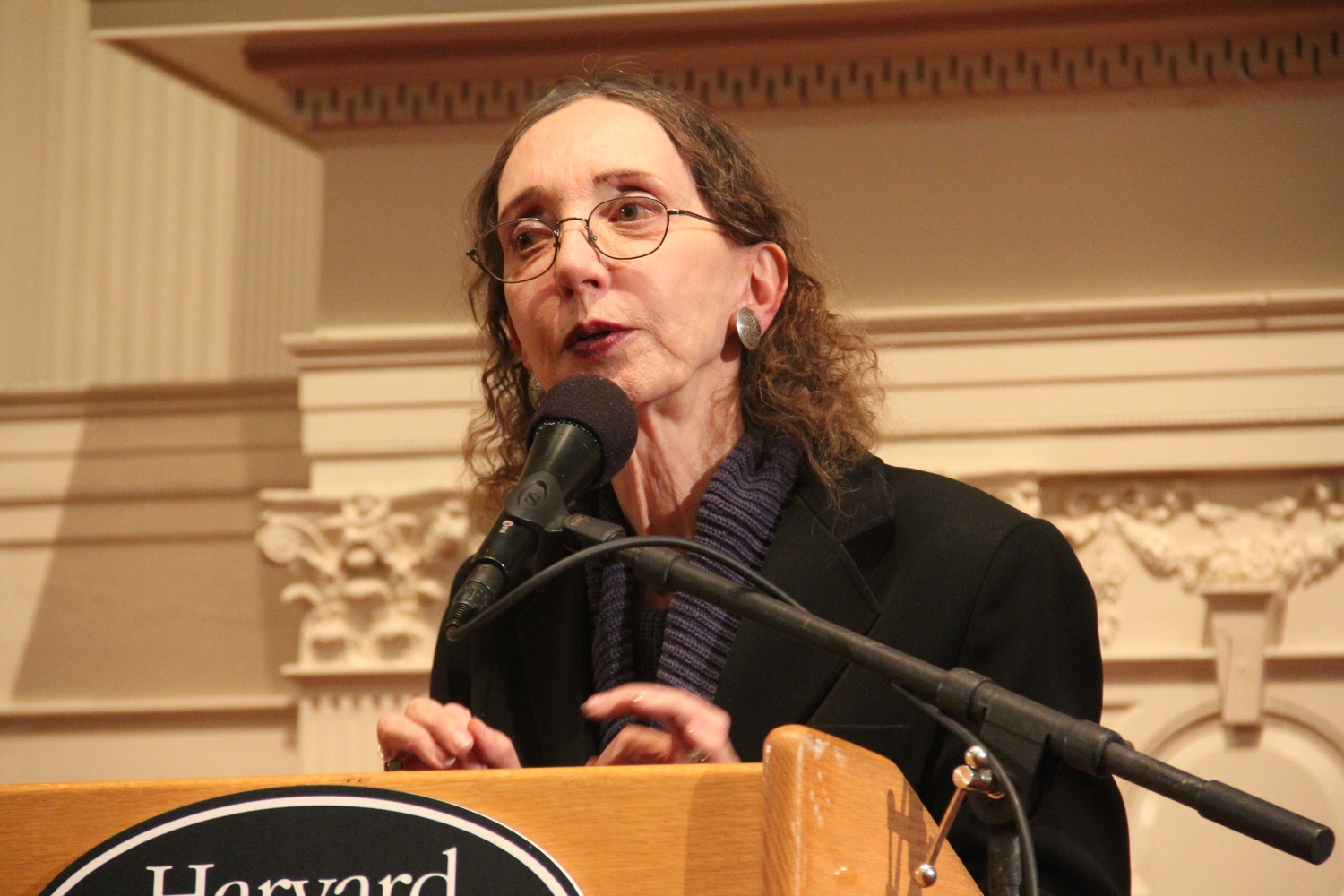
News
Harvard Quietly Resolves Anti-Palestinian Discrimination Complaint With Ed. Department

News
Following Dining Hall Crowds, Harvard College Won’t Say Whether It Tracked Wintersession Move-Ins

News
Harvard Outsources Program to Identify Descendants of Those Enslaved by University Affiliates, Lays Off Internal Staff

News
Harvard Medical School Cancels Class Session With Gazan Patients, Calling It One-Sided

News
Garber Privately Tells Faculty That Harvard Must Rethink Messaging After GOP Victory
Joyce Carol Oates: On Sad Chickens, Abandoned Farms, and Growing Up

Joyce Carol Oates is considered one of the finest contemporary American authors. A National Book Award winner and National Humanities Medal recipient, Oates is known for her prolific literary output—she has published more than 40 novels, along with many novellas, short stories, plays, poems, and essays. On Oct. 19, she read an excerpt from her recently published second memoir, “The Lost Landscape” at a Harvard Book Store-sponsored event at the First Church of Cambridge. The book recalls her early coming-of-age in upstate New York. On the Monday before her reading, The Harvard Crimson spoke to her about her inspirational sources and the background for the “Landscape.”
The Harvard Crimson: Did you feel that you had different responsibilities in writing a memoir than in writing fiction?
Joyce Carol Oates: Certainly, in writing a memoir you are trying to tell the truth, and that’s an definitely an enormous difference.… And then there are some things in it that I’ve had to imagine. If you remember part of a conversation with someone, you might remember the most important thing that’s said, but you don’t remember the words surrounding it. In writing a memoir you have to imagine what probably led up to this remark that you do remember. In that way it is a little like fiction, in the sense that you have to imagine a context. And when I write about my family farm I sort of shut my eyes and see this picture, and I’m basing it on a memory now that’s quite old, but our earliest memories are imprinted very deeply in our brain and may be the last memories that we have.… If you shut your eyes and really make an effort, you can be transported to your earliest surroundings, and you do sort of see them in a way, you know, not literally, but you can start to describe them.
THC: What did you enjoy about the memoir-writing?
JCO: My favorite part of the memoir is “Happy Chicken” and my childhood life. I prefer to read from the early sections rather than the later. The later sections become sad because my parents eventually die and everyone you know gets older and eventually they die, so a memoir usually has a sad ending. But it often has a really idyllic opening.
THC: What inspired you to write from the perspective of a hen you had growing up in the “Happy Chicken” section?
JCO: Well, I wanted to write about my experiences between the ages of two and six…but I couldn’t really have much perspective from the point of a view of a child so young. I don’t have any real intellectual memory of that child, so the only way that I could write about it was from a perspective that was outside the [childhood]. So Happy Chicken is able to talk about the father and the mother, and Happy Chicken can look ahead into the future. It’s sort of a literary device that allows the author to transcend the limits of a point of view.… I’m truly not sure what happened to Happy Chicken. I hope that my grandmother didn’t just slaughter him. That may have been just what happened, but I remember that Happy Chicken just sort of disappeared. So it’s like some of our childhood fantasies and things we love when we were children, and they were very much part of our childhood memories, but then we don’t really know what happen[s] to them, and we have to grow up.
THC: On that subject, I was wondering about the significance of the title and the idea of a lost landscape.
JCO: The landscape is actually lost because the farmhouse is gone. The farm was sold, other people live there, and they built a different house.… “The Lost Landscape” also refers to childhood itself and to our memories. We keep trying to come back but we can’t really get there because it is lost and gone.
THC: Did you feel that, in writing this memoir, you were able to sort of preserve or crystallize that landscape in some way?
JCO: Yeah, pretty much. I wrote a lot about some things, like the abandoned houses, in our part of Erie county. There seemed to be a lot of farms, abandoned houses, and we did a lot of exploring in those houses.… That really awakened my early interest in other people: Seeing these clues left behind, things on the floor or articles of clothing in the closet, just made me really wonder who the people had been. It was almost like the houses were haunted. So I found it really stimulating, and when I think about it even now, it makes me feel that I want to write something.
—Staff writer Amy J. Cohn can be reached at amy.cohn@thecrimson.com.
Want to keep up with breaking news? Subscribe to our email newsletter.
